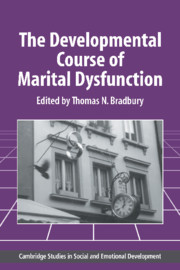Book contents
- Frontmatter
- Contents
- List of Contributors
- Foreword
- Introduction: The Developmental Course of Marital Dysfunction
- Part I Conceptual and Empirical Contributions
- Part II Invited Commentaries
- 12 On Intervention and Relationship Events: A Marital Therapist Looks at Longitudinal Research on Marriage
- 13 A Developmentalist's Perspective on Marital Change
- 14 Couples, Gender, and Time: Comments on Method
- 15 On the Etiology of Marital Decay and Its Consequences: Comments from a Clinical Psychologist
- 16 Problems and Prospects in Longitudinal Research on Marriage: A Sociologist's Perspective
- 17 A Social Psychological View of Marital Dysfunction and Stability
- Author Index
- Subject Index
13 - A Developmentalist's Perspective on Marital Change
Published online by Cambridge University Press: 13 October 2009
- Frontmatter
- Contents
- List of Contributors
- Foreword
- Introduction: The Developmental Course of Marital Dysfunction
- Part I Conceptual and Empirical Contributions
- Part II Invited Commentaries
- 12 On Intervention and Relationship Events: A Marital Therapist Looks at Longitudinal Research on Marriage
- 13 A Developmentalist's Perspective on Marital Change
- 14 Couples, Gender, and Time: Comments on Method
- 15 On the Etiology of Marital Decay and Its Consequences: Comments from a Clinical Psychologist
- 16 Problems and Prospects in Longitudinal Research on Marriage: A Sociologist's Perspective
- 17 A Social Psychological View of Marital Dysfunction and Stability
- Author Index
- Subject Index
Summary
A developmental perspective on marriage and marital dysfunction is a welcome advance for the field. Tracing the pattern of change over the course of a marital career is one of the great intellectual puzzles for scholars, clinicians, and couples themselves. One of the goals of this commentary is to place the study of marriage in a life span developmental perspective in order to broaden the scope of the inquiry and provide an overarching framework for considering the longitudinal study of marriage.
A Life Span Developmental Perspective
Several tenets of a life span view merit attention. First, the focus on normative and nonnormative events is of relevance to the study of marriage. Second, this viewpoint emphasizes multiple developmental trajectories. Although the individual development of adults (and children) within a family is important, these can only be understood with reference to other aspects of development, such as the developmental pathway followed by larger units such as the husband-wife dyad or the parent-child dyad, as well as the family unit itself (Parke, 1988; Sigel & Parke, 1987). Moreover, it is argued that the concept of multiple developmental trajectories not only recognizes that individuals, dyads, and family units may follow disparate developmental pathways but that it is necessary to acknowledge the interplay among these different trajectories in order to understand the longitudinal course of marital relationships.
- Type
- Chapter
- Information
- The Developmental Course of Marital Dysfunction , pp. 393 - 409Publisher: Cambridge University PressPrint publication year: 1998
- 7
- Cited by



